Henry Huiyao Wang's transcript on Semafor's 2024 World Economy Summit
President of CCG addresses controversies surrounding China's development funding.
On April 18, 2024, Henry Huiyao Wang, Founder & President of CCG, was invited to speak at a session at Semafor's 2024 World Economy Summit. The session, themed "Rising Global Middle Class: Is Rising Developing Nation Debt a Blessing or a Curse?", was moderated by Gina Chua, Executive Editor of Semafor. The complete video of the session is available on YouTube.
Here is the full transcript of the conversation between Henry Huiyao Wang and Gina Chua.
Gina Chua
Dr. Wang, let me just start by sort of setting the landscape if you like, and I would ask you to comment. The landscape of development funding has really changed a lot since the Belt and Road was first launched—we've got interest rates up and as a result, we have some serious debt burdens in a lot of countries. China is grappling with its own domestic economic issues. We see that the sovereign lending to Africa, for example, is now at its lowest point in two decades, I believe. There's much more overt strategic competition now between the U.S. and China, which I think means that the US is turning a lot more attention toward some of the areas that were neglected before. And of course, we've got new entrants in Gulf money and Turkish money in that landscape. How does that impact your thinking on China's strategy for development funding?
Henry Huiyao Wang
Thank you, Gina. Good morning to all the distinguished panel and participants. I think China has actually been doing quite consistently for the last number of years. And I realize that there's a huge Global South infrastructure deficit. Also, there's a lot of first-hand development (projects) for the developing countries. So China has actually been proactive. For example, over a decade ago, China launched its Belt and Road initiative, which emphasizes infrastructure and investment. So far, for the last decade, China has invested $1 trillion and about 3,000 projects across the Global South. Also, China has established an Asian Infrastructure Investment Bank (AIIB), where 107 countries, most of European countries and developed countries are in it. And India is its largest recipient.
So I think this initiative has generated a lot of corresponding reaction, which is good. We have the U.S. proposing the B3W, “Build Back Better World”, the EU proposing the “New Global Gateway”, and India proposing the “India-Middle East-Europe Economic Corridor (IMEC)”. So let's all address this infrastructure deficit.
But of course, as you said, the investment is slowing down a little bit. I think that may be true. But on the other hand, there are more socially oriented projects, more education, health, and social security projects—those things are coming up.
So I think infrastructurewise, it's still good. You know, we have just finished Jakarta-Bandung, the super railway that connects places from 4 hours to 40 minutes. And then you'll see a new project proposed for ASEAN. In the future, ASEAN will be super connected. So I think China is still doing its best to work with the Global South and to work with developed countries if necessary, and multinationals to work together for solving this global deficit.
Gina Chua
Can I turn a little bit to the debt burdens that a lot of countries are working their way through now, especially in Africa? You know, obviously, that's a function of a higher interest rate environment. China certainly holds a large part of African debt. What can or should China be doing to alleviate these issues because obviously, beyond development financing, the debt burden is becoming crushing for some countries?
Henry Huiyao Wang
That's one of the issues. But also, on the other hand, I think there is a lot of hype in the media. If you look at the real numbers, China's debt in African countries is probably much lower than people expected. The large chunk was from multi-lending agencies [multilateral development banks] and, of course, from Western developed countries. Even talking about China's so-called debt trap in Sri Lanka, China’s debt in Sri Lanka is less than 10% and is not really an issue according to the local government. So there's a lot of talking about that. But on the other hand, China is working with G20 and other developed countries. For instance, recently, they have reached some consensus on the debt issue in Zambia. So I think China is open to that if there's any issue, but China is not the real problem. China has created a lot of benefits for those developing countries. And China is willing to work with the international community to address that issue, as obviously, it could be a challenge in the future.
Gina Chua
The other issue I wanted to raise is that, certainly, there is much more concern, in the U.S. at least, about protecting or consolidating the supply chains—certainly over the climate. So the energy transition in terms of making sure that they have access to the supplies you want - presumably the same for China—and an increasingly, of course, moving to devolve away from reliance on China's manufacturing center. How does that play in how you think the Global South looks at its development needs and where they get the financing from?
Henry Huiyao Wang
Actually, through itself, China has developed a very resilient supply chain. If you look at China, China has almost four million 5G stations; and then in Europe, you have 400,000—just one-tenth of the number of 5G stations in China. China also has 70% of the global speed railway. Also, out of the 10 largest container ports in the world, China has seven of them. So you can see the supply chain. That's why companies' investment in China is still very strong. Recently, we've seen Olaf Scholz taking some German industry people there. So the auto industry is really benefiting from the Chinese market. Also, in Tesla, half of the Tesla EV cars are produced in China and then exported everywhere, not just in China.
So I think, because China has every year a thousand million fresh college graduates and abundant talent, it really makes sense to have this “in China for China”, but also “in China for the world.” And you have the highest efficiency and productivity. As the Chinese premier said, now we have 400 million middle-class; by the next decade, we could have 800 million. So this is a fast-growing market. You know, all those 145,000 companies don't want to abandon this fast-growing market if they want to grow. So I think that it's quite resilient.
The so-called overcapacity and oversupplies that are a bit, you know, overestimated because there's a big demand for EV cars worldwide; and the Global South needs that. Also, there's a big demand for solar panels. We need low-cost solar panels to combat climate change. If China can produce this effectively, why not benefit the world? You know, China buys a lot of airplanes from the U.S.; China doesn't refuse to buy them because they were invented by the Wright brothers or they are made in the U.S. We should have that kind of mentality. We should really take advantage of the competitive advantage of every country and really benefit the world for development.
Gina Chua
I guess the question really is less about the Chinese EV industry competing against the U.S. or the European EV industry, but more a case of what happens to countries that are trying to climb the manufacturing ladder the way the Asian Tigers did—the way that China did as well. Faced with cheap, good goods from China—I don't think anybody suggested that these are not high-quality goods—it potentially blocks off an access of development that other countries have used in the past.
Henry Huiyao Wang
Well, not necessarily. I think other countries have other advantages. Every country has. China buys a lot of red wine from Australia, from South Africa, from many other countries. Now China also buys a lot of technology products from the U.S., which the U.S. has forbidden to sell, like chips. China is the largest chip buyer in the world, and 200 or 300 billion of that import has now gone for the U.S. chip companies and other associated companies that the U.S. brands to sell to China.
So this kind of idea is not against the principle of the free market that the U.S. has upheld for many years. I think everybody has their own advantage in doing things. For example, under the dollar payment system, all the money comes to the U.S. The U.S. has a lot of advantages; every other Western country has their own aspects of advantages; China has its own. So I think we should really work with each other, rather than saying: “Okay, I stop you, you stop me.” Let the economic law and market fundamentals play their own roles to balance the world economy.
China is also spending a lot of money by having a lot of tourists around the world, and that's good. Before the pandemic, the largest spendings by tourists came from China—150 million people travel around, spending $200 billion. So they can always benefit each other, not having this "high fence, small yard."
Gina Chua
Let me slide in one really quick question before we have to get up and bring some other people on stage. One of the complaints about Chinese development funding is that it's often tied to Chinese companies. Just wanted to get your comment on that.
Henry Huiyao Wang
I think that may be partly true, but I don't think it's the whole case. China has opened, for example, the Asian Infrastructure Investment Bank (AIIB). China is leading that bank, but the largest recipient of its loans is India. China is also willing to work with the World Bank, MDBs, or other banks.
And then I really see that the BRI, B3W, and EU Global Gateway have a lot of synergy to work together. Some Belt and Road contracts were gained by different countries. So, of course, China can be more open on that and I'm sure, but we also need a reciprocal, because Chinese companies like Huawei and TikTok are also being chased and attacked in Western countries, which is maybe too politically oriented.
So I think we should really give a level playing field for both companies in both countries so that we have a better environment to work together, rather than sanctioning each other. There are now over 1,000 companies on the U.S. Entity List, and there are only a few (sanctions) from China. So I think we could really work together in the future to have better examples to show the world that we should not decouple or de-risk. The biggest risk is the climate, pandemic, and AI—all those things and their side effects, rather than fighting among ourselves, which is counterproductive.
Gina Chua
Thank you very much. Thank you for your time. Really appreciate it.
Henry Huiyao Wang
Thank you.

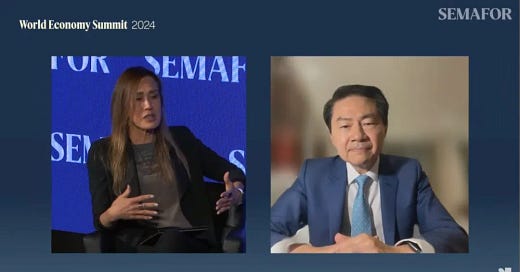



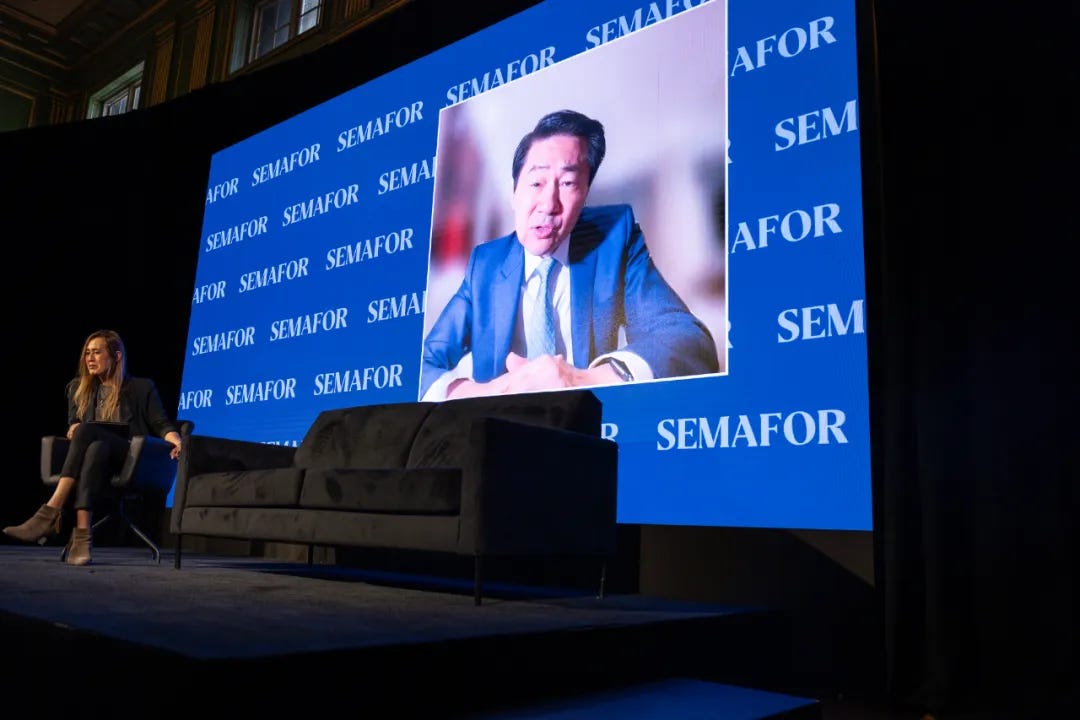

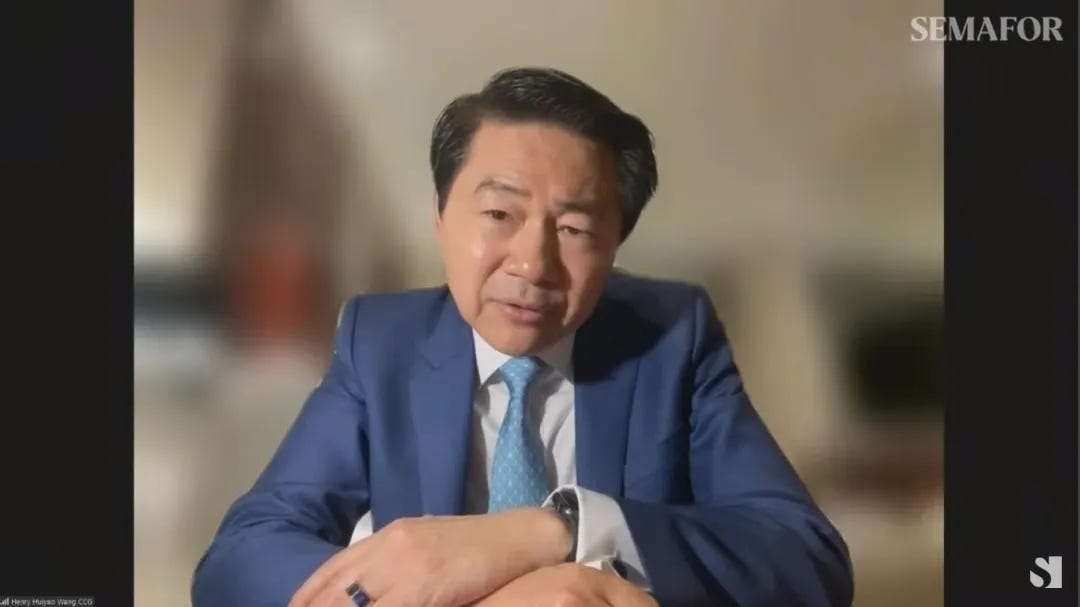
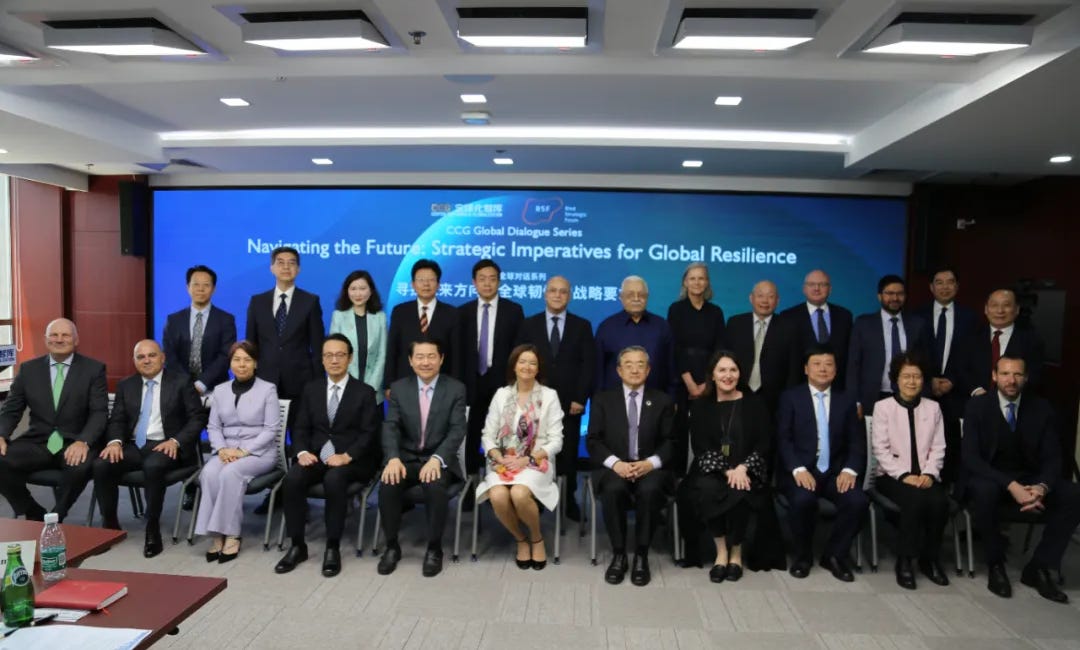
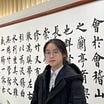
How can I work as an intern @ CCG? I got soo much passion for global affairs and issues.